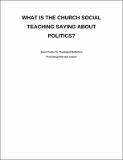| dc.contributor.author | Liche, Dominic | |
| dc.date.accessioned | 2020-10-13T08:13:01Z | |
| dc.date.available | 2020-10-13T08:13:01Z | |
| dc.date.issued | 2010-08 | |
| dc.identifier.citation | Liche, D. (2010). What is the Church's Social Teaching on Gender Equity?. Lusaka, Zambia: Jesuit Centre for Theological Reflection (JCTR) | en |
| dc.identifier.uri | https://repository.jctr.org.zm/handle/20.500.14274/120 | |
| dc.description | The word "politics" comes from the Greek word "polis" meaning “state” or “city”, and what concerns the affairs of the state or city is referred to as "politikos." Politics therefore, is about social organization and relations that involve how a group of people make decisions. It concerns the manner in which authority and power are used in a group of people (what is sometimes referred to as governance). This usually involves formulation and application of policies for the good of people in that community or state.
Politics is often practiced within a state or civil government, even though it can be observed in any human interactions like in the private sector, corporate sector, in religious institutions and even in academia. Politics should not be confused with political
science, which is the academic study of politics. Political science tends to concentrate on theory and application of theory to practice. | en |
| dc.description.abstract | The Church, by reason of her role and competence, is not identified in any way with the political community nor bound to any political system. She is at once a sign and a safeguard of the transcendent character of the human person. The Church and the political community in their own fields are autonomous and independent from each other. The more that both foster sounder cooperation between themselves with due consideration for the circumstances of time and place, the more effective will their service be exercised for the good of all. It is a part of the Church's mission to pass moral judgments even in matters related to politics, whenever the fundamental rights of man or the salvation of souls requires it. (Vatican II, “Pastoral Constitution on the Church in the Modern World,” No. 76) There is often a misunderstanding as to what politics really is. This can be seen in statements such as “politics is a dirty game”. Is politics really just a game? Is politics dirty at all? What is the aim of politics? What has the state got to do with politics? Can politics really contribute to justice and full human development? These and many other questions come up immediately as we share with you what the Church’s Social Teaching says on the issue of politics. | en |
| dc.language.iso | en | en |
| dc.publisher | Jesuit Centre for Theological Reflection | en |
| dc.rights | Attribution-NonCommercial-ShareAlike 3.0 United States | * |
| dc.rights.uri | http://creativecommons.org/licenses/by-nc-sa/3.0/us/ | * |
| dc.subject | Catholic Social Teaching | en |
| dc.subject | Politics | en |
| dc.title | What Is The Church’s Social Teaching Saying About Politics? | en |
| dc.type | Book | en |

